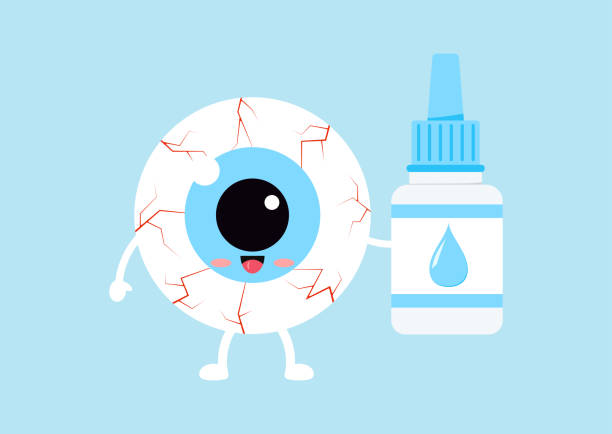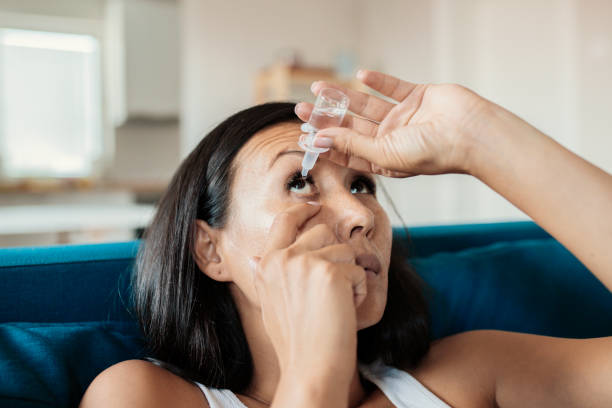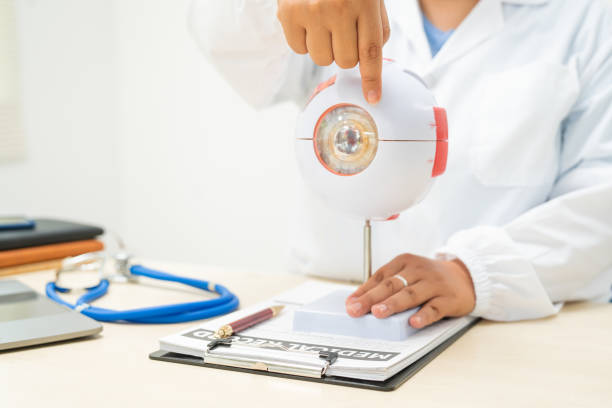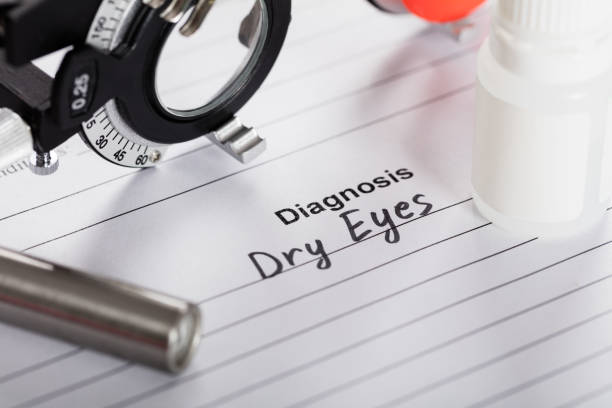Dry eyes can feel like sandpaper rubbing across your eyeballs. They may itch, turn red, and leave your eyes sore and irritated all day long. Whether you’re working on a computer, driving at night, or trying to fall asleep, dry eyes can ruin your focus and comfort. If you’re looking for dry eye treatments that actually work, you’ve come to the right place.
In this guide, we’ll cover the best ways to treat dry eyes. You’ll learn about natural home remedies, smart lifestyle changes, and effective medical treatments. We’ll also explain the common causes of dry eyes and give you tips to stop them from coming back. Whether your symptoms are mild or severe, this guide will help you find real relief.
What Are Dry Eyes?
Dry eye happens when your eyes don’t make enough tears or when your tears dry out too quickly. Tears do more than just show emotion—they protect your eyes, keep them moist, wash away dust, and help you see clearly. Without enough tears, your eyes can feel dry, sore, and irritated.
Common Symptoms of Dry Eye:
- Stinging or burning
- Gritty or sandy feeling
- Redness
- Blurry vision
- Light sensitivity
- Watery eyes (yes, too much tearing can mean your eyes are dry!)
Causes of Dry Eyes
There are many reasons why you might have dry eyes. It could be due to aging, screen time, allergies, or even the weather. Understanding what’s causing your dry eyes is the first step to finding the right treatment and getting fast relief.
Top Causes:
- Screen time – staring at phones, tablets, or computers can make you blink less often. This can lead to dry, tired, and irritated eyes over time.
- Aging – as we get older, our eyes make fewer tears. This natural change can lead to dryness, irritation, and a higher risk of dry eye symptoms.
- Contact lenses – wearing them for long periods can dry out your eyes. They may reduce oxygen flow and affect your tear film, leading to discomfort and irritation.
- Medications – some medicines like antihistamines, antidepressants, and birth control pills can make your eyes dry. They may reduce tear production and cause irritation over time.
- Health conditions – certain issues like diabetes, thyroid problems, or autoimmune diseases can lead to dry eyes. These conditions may affect tear glands and reduce how many tears your eyes make.
- Dry environments – air conditioning, heaters, and wind can lower the moisture in the air. This makes it easier for your eyes to dry out, leading to irritation and discomfort.
- Eye surgery – procedures like LASIK and other vision surgeries can affect the tear glands. This may lead to reduced tear production and cause dry eye symptoms during recovery or even long term.
Tip: A visit to an eye doctor can help you figure out the exact cause. They may do a tear test to measure how well your eyes produce moisture.

Best Treatments for Dry Eyes (That Actually Work)
You don’t have to suffer from dry eyes. Whether your symptoms are mild, moderate, or severe, there’s a treatment that can help. With the right care, you can soothe your eyes and feel better fast.
1. Artificial Tears (Lubricating Eye Drops)
These are the first choice for many people with dry eyes. They add moisture, reduce irritation, and help soothe your eyes quickly. You can use them during the day or at night for fast, easy relief.
What to look for:
- Preservative-free options (safer for long-term use)
- Gel drops for longer-lasting relief
🔗 Learn more from the Mayo Clinic
2. Warm Compresses
Placing a warm, damp cloth over your closed eyes can help unclog blocked oil glands. This allows the natural oils to flow better, helping your tears stay on your eyes longer without drying out. It’s a simple and soothing way to find relief.
How to use:
- Soak a clean washcloth in warm water.
- Place over closed eyes for 5–10 minutes.
- Repeat twice a day for best results.
3. Omega-3 Supplements
Omega-3 fatty acids can help lower inflammation in your body, including in your eyes. They may also improve the quality of your tears, making them more effective at keeping your eyes moist and comfortable.
Best sources:
- Fish oil capsules
- Flaxseed oil
- Fatty fish like salmon and sardines
Clinical note: A 2022 study from the American Academy of Ophthalmology found mixed results, so it’s best to ask your eye doctor first.
4. Blink More (Especially at Screens)
When you stare at phones, tablets, or computer screens, you tend to blink less. This can cause your tears to dry up faster, leaving your eyes feeling dry, tired, and irritated.
Tips to reduce digital eye strain:
- Follow the 20-20-20 rule: Every 20 minutes, look at something 20 feet away for 20 seconds.
- Set screen breaks or use blue light filters.
5. Use a Humidifier
Dry indoor air—especially from heaters, fans, or air conditioning—can pull moisture from your eyes. This makes them feel dry, scratchy, and uncomfortable, especially in closed spaces with little airflow.
A small room humidifier adds moisture to the air, which can help prevent your eyes from drying out. It’s especially helpful at night when heaters or AC are running and the air gets even drier.

6. Prescription Eye Drops
If over-the-counter eye drops don’t give enough relief, your doctor may suggest prescription drops. These stronger treatments can help reduce inflammation and boost tear production for long-term comfort.
Common options:
- Cyclosporine (Restasis®) – helps your eyes make more tears
- Lifitegrast (Xiidra®) – reduces inflammation
- Corticosteroid drops – short-term use for quick relief
These treatments focus on the root cause of dry eyes—not just the symptoms. By treating the source, they help give longer-lasting relief and better eye health over time.
7. Punctal Plugs
If your tears drain too quickly, your doctor may place tiny plugs in your tear ducts. These plugs help keep moisture on the surface of your eyes longer, giving you more lasting relief from dryness.
This is a quick and painless procedure done right in your doctor’s office. It offers long-term relief by helping your eyes stay moist and comfortable throughout the day.
8. Lifestyle Changes That Help
Sometimes, even small changes to your daily routine can bring big relief from dry eyes. Simple habits can make a big difference in how your eyes feel every day.
Try this:
- Stay hydrated (drink 8+ glasses of water daily)
- Wear wraparound sunglasses to block wind and sun
- Quit smoking (it makes dry eye worse)
- Limit caffeine and alcohol
9. Natural Remedies for Dry Eyes
Some people find relief from dry eyes by using gentle, at-home remedies. These simple treatments can soothe irritation and improve comfort without needing a trip to the doctor.
Popular natural options:
- Castor oil eye drops – may improve tear stability
- Aloe vera gel (applied around the eyelids, not in eyes)
- Cucumber slices – reduce puffiness and cool the eyes
Important: Always talk to your doctor before using natural products for dry eyes. This helps you avoid irritation, allergic reactions, or possible eye infections from unsafe ingredients.
10. Specialty Devices and Procedures
For chronic or severe dry eye, your eye doctor may recommend advanced treatments. These options go beyond basic care and may include procedures like:
- Intense pulsed light (IPL) therapy
- Thermal pulsation therapy (LipiFlow®)
- Amniotic membrane grafts – for healing very damaged eyes
These treatments are often used when basic remedies don’t bring enough relief. They offer stronger, longer-lasting results for people with stubborn or serious dry eye symptoms.
When to See a Doctor
If your dry eye symptoms don’t improve—or if they start to get worse—it’s time to contact your eye doctor. Getting the right care early can help prevent more serious problems and protect your vision.
Call a pro if you notice:
- Constant burning or pain
- Vision changes
- Eye infection signs (redness, discharge, swelling)
Ignoring dry eye can lead to serious problems, including damage to your cornea. That’s why it’s important to get treatment early and not wait too long to take action.

Can You Prevent Dry Eyes?
Yes! You can take simple steps to lower your risk of dry eyes and protect your eye health every day. Small daily habits can go a long way in keeping your eyes comfortable and clear.
Prevention tips:
- Blink often when on screens
- Stay out of dry, windy environments when possible
- Take breaks during reading or computer work
- Keep your eyes clean, especially if you wear makeup
- Eat a diet rich in omega-3s and vitamins A, C, and E
Final Thoughts: Relief Is Possible
Dry eyes don’t have to be something you deal with every day. With the right care—like using eye drops, warm compresses, or getting medical help—you can find relief that fits your needs and helps your eyes feel better.
Start with simple steps like blinking more often and using artificial tears to keep your eyes moist. If your dry eye symptoms are more serious or don’t improve, talk to your eye doctor about advanced treatment options that can help.
👀 Your eyes deserve to feel good again—take the first step today!

